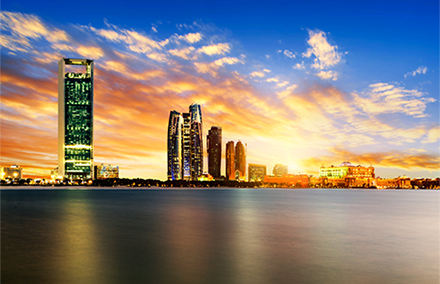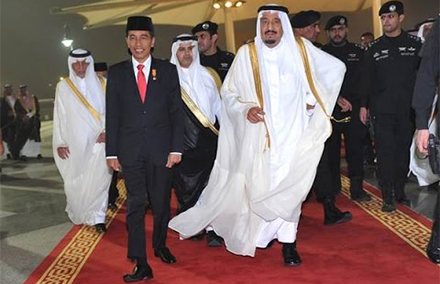
Abu Dhabi. Photo: Getty Images.
Indonesia heads to the UAE for arms (and more).
This September, Indonesia’s government-owned arms manufacturer PT Pindad signed a new defense partnership with the United Arab Emirates. The deal came on the sidelines of President Joko ‘Jokowi’ Widodo official visit to the Gulf country.
Under the agreement, PT Pindad will transfer technologies to the Emirates’ defense logistics and support firm Continental Aviation Service (CAS), with the objective of enabling the national manufacture and marketing of Indonesian exports. These include the SS2 assault riffle and various other weapons.
At the same time, the agreement will see CAS, alongside Canada’s Rheinmentall Defence, import various technologies to Jakarta, enabling PT Pindad to develop remote weapons systems for the Indonesian and other militaries in the region.
The deal also includes plans for Jakarta to begin shipping over 100 units of the X18 Fire Support Vessel – known as the Tank Boat – to the Emirates. The ship is currently being manufactured by PT Lundin in cooperation with Brussels-based CMI Defense which built the boat’s 105mm cannon.
The deal is not surprising given that in recent years Jakarta has planned on upgrading its military capabilities and manufacturing defense technologies locally. It also aims to strengthen partnerships with manufacturers overseas to facilitate the transfer of knowledge and prospective exports. Companies, such as PT Pindad, are pivotal in this aspiration.
This, however, is not a new development in Jakarta-Abu Dhabi ties. Since 1976, the two governments have witnessed remarkable, yet silent, growth in their two-way relationship.
It is reported that the trade volume between the two countries stood at around US$ 4.2 billion last year. The UAE is also reportedly one of the largest investors in Indonesia, with direct investment hitting $25.4 million.
Seeing great prospects in its economic ties with the Emirates, in 2003 Jakarta opened the Indonesian Trade Promotion Centre (ITPC) in Dubai and the Indonesian Investment Promotion Center (IIPC) in Abu Dhabi. The ties have also expanded into different fields including education, Islamic banking, and the automotive industry.
Cooperation in infrastructure is also on rise. Earlier this year, the UAE’s Tasweek Real Estate Development announced a US$ 300 million plan for a mixed-use project on Bintan Island. The project, comprising a 26-hectare complex, consists of condominium towers, villas, hotels, as well as commercial stores. Abu Dhabi has also participated in the construction of a 130-kilometre railway in East Kalimantan.
The UAE-Indonesia relationship is also shaped by people-to-people exchanges. There are approximately 80,000 Indonesians living in the Gulf state. This is perhaps the main reason behind the UAE’s decision to ink a deal with Bank Rakyat Indonesia, which assists Indonesian expatriates when sending money back home.

The new weapons deal came after Jokowi’s visit to the UAE.
Other efforts have also been taken to maintain people-to-people diplomacy. In 2007, the two countries signed a MoU on the protection of Indonesian workers in the UAE, and another on combatting human trafficking early this year. To facilitate this rapidly growing partnership, in 2006 the UAE and Indonesia signed a MoU on air transportation.
Relations have also been strengthened by aid and loans. In 2009, First Gulf Bank offered a $350 million loan to Indonesia’s coal firm PT Asmin Koalindo Tuhup (AKT) for exports. In mid-2000, the government in Abu Dhabi also donated $100,000 worth of humanitarian aid for the people of Aceh in the aftermath of that region’s conflict.
As indicated by Jokowi during September’s UAE-Indonesia Business Forum, there is much potential in strengthening and deepening the countries’ relations.
Even though it is Southeast Asia’s largest economy, Indonesia still needs billions of dollars to revamp its economy and slash unemployment. It has also been keen to expand its consumer market to hedge against the danger of potential economic mayhem in Europe and America.
The UAE not only provides Indonesia a gateway to access untapped consumer markets, but also serves as an important hub for economic expansion in the Middle East.
At the same time, Indonesia’s geographical position as Southeast Asia’s biggest economy and a G20 member makes it an alluring target for investment. With a population of more than 250 million, Indonesia is a very enticing consumer market for Emirati exports.
Jakarta’s strategic location also provides the Emirates an opening to boost its presence in the region. In recent years, the UAE, with its ‘Look East’ policy, has been interested in luring Asian investment.
Lastly, the UAE enjoys reciprocal ties with Jakarta due to Indonesia’s stance on several issues, including Palestine and the Syrian conflict, which largely correspond with the UAE’s position.
Jokowi’s visit could be the first step in steering Indonesia’s ties with Gulf countries in a more strategic direction.
It may seem one small step for him, but the visit could herald Jakarta’s long awaited massive bound into the great game’s Middle Eastern theatre.
Muhammad Zulfikar Rakhmat is a PhD scholar at the University of Manchester.
 Facebook
Facebook  Twitter
Twitter  Soundcloud
Soundcloud  Youtube
Youtube  Rss
Rss 